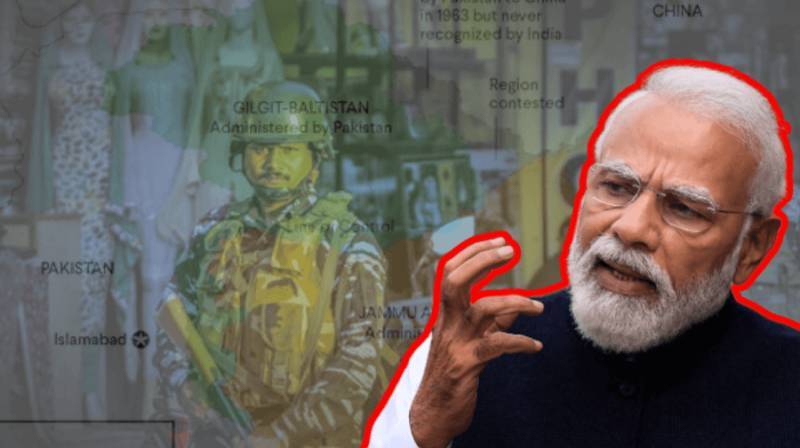
"Forgotten occupations gather cobwebs.
Silence on trampled laws is not passivity, rather endorsement."
A personal realisation struck me after a conversation with one of my friends in university, who hails from Jammu and Kashmir and whose home is enduring an Orwellian whirlwind through and through at the hands of the Indian occupation.
His voice strained as he narrated the soul-crushing reality of occupation and curfews, which transformed his childhood haven into a giant, open-air prison. This stark duality – the peaceful home they once cherished versus the life under siege they were now forced to endure – struck a deeply personal chord. It forced me to confront a sobering truth: in our discourses on international conflicts, we often fall prey to dangerous illusions where we strip them of their humanity and reduce them to mere pawns on a global chessboard to be dealt with for political point scoring in national elections or resources to be plundered for economic gain. Lost amidst the grand narratives are the countless human stories – individuals like my friend, for whom this isn't just a political talking point but a living reality. This is their home, their sanctuary, and their everyday struggles under occupation with no hope for imminent escape from this suffocating state of affairs is not just another talking point.
On August 5, 2019, India revoked Article 370 of their Constitution, whereby they illegally and unilaterally stripped the disputed territory of Jammu and Kashmir of its special autonomous status. This action, devoid of any legal grounds or a Kashmiri buy-in, was closely followed by a series of human rights violations, including an illegal imposition of curfew and the indefinite denial of access to the internet to crush the Kashmiri opinion on the move.
The revocation of Kashmir's special status under the Indian Constitution directly undermines fundamental principles of international law – the right to self-determination. This right grants people the power to decide their political future. By stripping Kashmir of its autonomy, India imposed its will on the Kashmiri people, denying them a say in their governance - everything is monitored and guided.
Freedom of expression and opinion, as enshrined in Article 19 of the Universal Declaration of Human Rights, came under simultaneous assault in Kashmir. In the wake of Article 370 revocation, Indian authorities imposed a brutal crackdown on dissent. Kashmiri voices were silenced through intimidation and arrest, creating an environment of perpetual fear for all.
A similar fate befell the rights to peaceful assembly and association, protected under Article 20 of the Universal Declaration. Public gatherings were banned, and social organisations faced crippling restrictions. This systematic denial of the right to assemble and associate effectively dismantled the social fabric of Kashmiri society.
A world where might make right, where international law becomes a tattered scroll, and occupations are forgotten and adopted as the norm
Freedom of movement, another cornerstone of human rights enshrined in Article 13 of the Universal Declaration, has been severely restricted. Kashmiris are now effectively prisoners in their own land. Curfews restrict movement within the region, while travel checkpoints create a suffocating atmosphere. The ability to come and go freely, a basic human right, has simply evaporated.
The revocation of Article 370 has fostered a growing atmosphere of religious discrimination as the Narendra Modi-led government is attempting to change the ethnic and religious demographics of Kashmir, a Muslim-majority region with a rich Muslim heritage. There have been extensive violations of the rights of freedom of thought, conscience, and religion, protected under Article 18 of the Universal Declaration.
There is an endless list of violations of international law, yet we remain silent—a silence that is precedent with far-reaching dangers.
The story of my friend is not unique. It represents the plight of millions of Kashmiris whose lives have been upended by India's illegal actions. The international community cannot turn a blind eye to these blatant human rights violations in Kashmir. We must hold India accountable and demand that Kashmiris are allowed to exercise all of their basic rights, including the right to self-determination. Only then can peace and stability return to this war-torn region.
We risk etching a dangerous precedent: a world where might make right, where international law becomes a tattered scroll, and occupations are forgotten and adopted as the norm.
Let us not be complicit in this erosion of Kashmir and her people. Let our voices rise, reminding the world that justice demands accountability, and the occupation and its crimes must never be forgotten – this article being my humble attempt at it.

